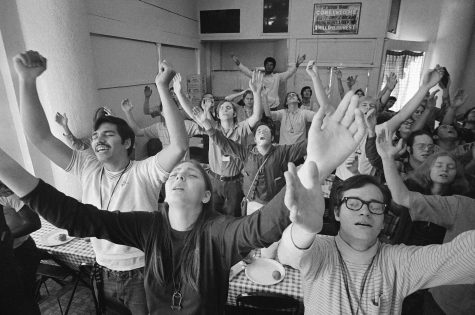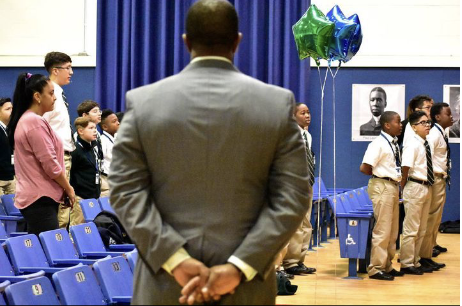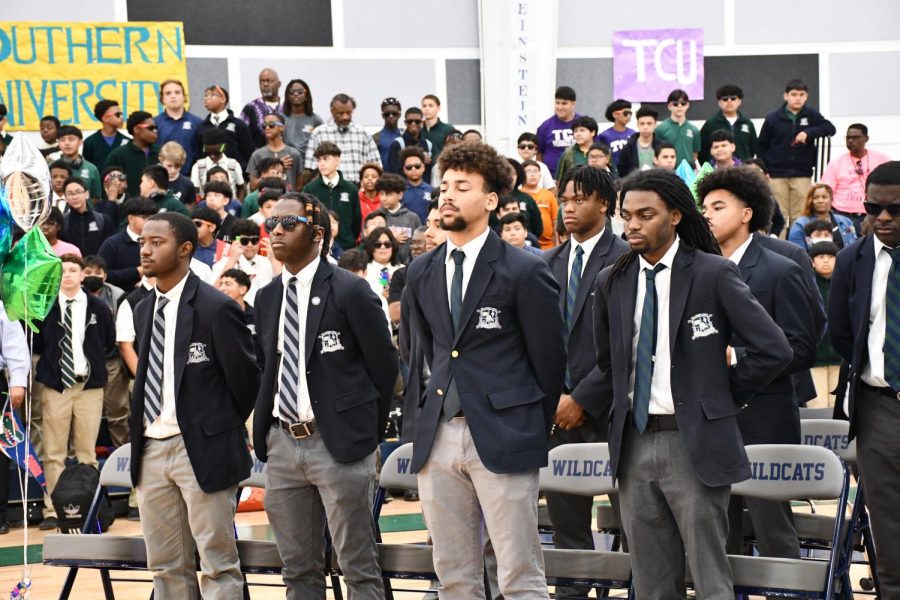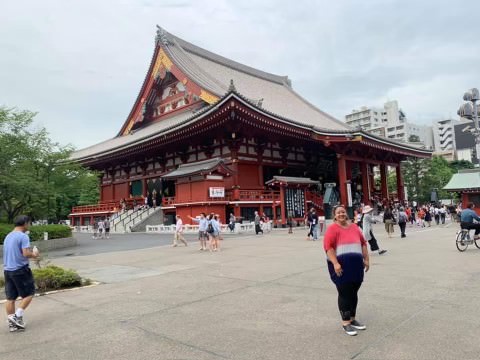Op-Ed
At the Back to the Future Dance hosted in September, two girls who came from an outside school decided to talk to me told me that our school sounds like a cult, and that it’s weird, which I took note of as it was a thought that had crossed my mind in the past . It finally piqued my interest when they asked to be added to a group chat with some of the freshmen and sophomores, and then they both agreed that most people who attend this school are also weird, and “victims” of Mr White’s indoctrination. After this, I set out to get a better understanding of our school, and answer the question, is YMLA a cult?
Student Interviews and Opinions
I asked a few people in my class about our school and their thoughts on it. I asked each of them 4 questions: Did they feel like YMLA was brainwashing them, did they feel as though YMLA prepared them for the real world, is YMLA different from other schools, and did our school change them. All of the participants felt as though the school changed them on a subconscious level but they themselves couldn’t identify what it was. They all also felt as though YMLA was different from other schools in that it had more order to its inner workings. However, when asking about YMLA’s effectiveness, I received varying responses. One student said that our school tries to instill tunnel vision in its students, telling them that if they don’t go to college they won’t be successful. Another said that he felt as though Mr Prince, one of the high school math teachers, was the only dream team member who gave true real world preparation by holding discussions on the state of our nation, and how that effects them. Most of those I asked however, said that they felt as though YMLA was preparing them for the real world and giving them the tools needed for success in some way. Interestingly, almost every participant said that YMLA brainwashes its students as part of the path to success. Soon after my interviews, the concept of YMLA being a cult was put upon the student body at Conventus, allowing a much wider pool of people to give their thoughts on it. These ranged from defending the school by saying that it doesn’t hurt its students, but works to help them, to a conspiracy theory revolving around a cabal of Leadership Academies. But for the most part, the idea of us being a cult was agreed upon. However, to get a complete picture, I needed something to compare these answers to, so I contacted an alumnus(for future reference, alumni is the plural form of alumnus, not the singular).
Alumnus Interview
I reached out to a recent graduate of YMLA, who’s currently in college for his bachelor’s degree. I asked him, with little context, if YMLA brainwashed its students, to which he said “Yeah, yeah, I guess so, I ain’t even gonna lie.” When I asked him to elaborate, he, in his own words, said “through cult-like intervention”. Next, I asked if the school had prepared him for the real world, and he said no, not at all, and said that it was a complete culture shock when he made it to college. He also said it’s very different from other institutions in its leadership and goals, and explained that YMLA changed him, in that he’s realized he’s much more cynical and pessimistic, as a result of his experience at the school. I was curious, and pressed further about his experience there, and he told me about the suppression of expression at the school, assimilation, and other negative experiences he had here as a result of both students, the schools administration, and the policies enforced. While this may seem as though it’s just someone venting about their poor experience at our school, it’s a valuable piece of information, as he has, if YMLA is truly a cult, left it. Although the opinions on our school were a mixed bag, the disconnect between the more positive leaning students, and the more jaded alumnus made me question whether that was an example of indoctrination, or in more laymen terms, brainwashing. Students at YMLA are convinced it’s a more positive experience, while the alumnus, and some of his peers, say it’s a negative one, now that they look back on it. While I was thinking on this concept, I realized that in order to truly understand whether or not YMLA was a cult I’d have to learn more on what a cult even is.
So What Even Is A Cult?

Now that I had properly assessed the effect the school had on students I had to identify what a cult even is. After a quick look in a few dictionaries, on a surface level a cult is a system of veneration towards a figure or object, but it can also be built around a philosophy or spiritual belief. However, when this simple definition is applied to things we accept as normal today, the true meaning of a cult in our modern times is a lot clearer: a system of veneration that is frowned upon. Christianity is by definition, a cult. As is Islam, Judaism, Confucianism, and many other religions that follow a holy book, code, or are built around a person, yet none of these are referred to as cults unless in a way meant to demean one’s way of life. With this newfound understanding of cults, I tried to apply the definition to our school, and the glove fits, rather decently. A cult can be built around a philosophy, ideology, or an agenda, meaning something like the Analects, the 4 noble truths, or, in YMLA’s case, the mission and the creed. We also gather every other day to recite these values and commit to them. We have a philosophy that our school is built around, we have rituals devoted to veneration of this philosophy, we punish those who don’t adhere to it, our school, according to graduates, presents a very different, very sheltered view of the world, and as a cherry on top, we have a charismatic leader, Mr White. So that means YMLA is a cult right? Well, not quite, there’s one key detail missing, which is the devotion and loyalty of its members. The mixed bag of answers made me wonder if that hint of cynicism and lack of faith towards the school and its culture was always present like it is now, so there was one last question I asked the alumnus, which was if he noticed a change in the brotherhood, to which he said the school lost it as time went on. This piqued my interest, and the theory I had developed was furthered supported by my discovery that the Alumni Association meets monthly with the purpose of bringing back the br0therhood on campus. With Mr. Whites approval I attended one of those meetings, and was able to come a conclusion on the condition of our school
Is It A Bad Thing To Be Cult?
 After establishing that YMLA has cult-like tendencies, and hearing testimony from both past and present students, I was finally able to paint a clear picture of what YMLA really is. YMLA is a school that was built on practices similar to that of a cult, and while students in the past were devoted to the school and its beliefs, a kind of disconnect between the school and the student has become more prevalent, changing the way current students view the school, as well as alumni, who view the school negatively because its way of encouraging growth academically didn’t prepare them for life in the real world. That in itself is a lot, but what I realized through this, is that the shift in and rejection of culture at the school has negatively impacted YMLA performance wise. Up until last school year, YMLA was an A rated school, but now in this new landscape, it’s dropped to a B, presumably because of the year and a half long disruption caused by Covid-19. So, while the institution is there, the people aren’t anymore, and as a result the school suffers from the dismissal of its practices and its students no longer buying into it, and we might, as a school, do better academically if we embrace the oddities, campiness, and cult like nature of our campus.
After establishing that YMLA has cult-like tendencies, and hearing testimony from both past and present students, I was finally able to paint a clear picture of what YMLA really is. YMLA is a school that was built on practices similar to that of a cult, and while students in the past were devoted to the school and its beliefs, a kind of disconnect between the school and the student has become more prevalent, changing the way current students view the school, as well as alumni, who view the school negatively because its way of encouraging growth academically didn’t prepare them for life in the real world. That in itself is a lot, but what I realized through this, is that the shift in and rejection of culture at the school has negatively impacted YMLA performance wise. Up until last school year, YMLA was an A rated school, but now in this new landscape, it’s dropped to a B, presumably because of the year and a half long disruption caused by Covid-19. So, while the institution is there, the people aren’t anymore, and as a result the school suffers from the dismissal of its practices and its students no longer buying into it, and we might, as a school, do better academically if we embrace the oddities, campiness, and cult like nature of our campus.















Alexander • Sep 11, 2023 at 1:58 pm
I firmly believe that YMLA is not a cult, and I would advise against giving excessive weight to individual opinions on this matter. It’s crucial to acknowledge that everyone has their own perspectives, and what might be perceived as cult-like tendencies could, in reality, be attributed to elements such as dress codes and student mottos, which are typical in educational environments. These elements play a vital role in teaching students valuable life skills, including discipline, responsibility, resilience, and respect for others. In essence, YMLA is fulfilling its core educational mission by instilling these important values in its students.
MrTluv • May 27, 2023 at 11:50 am
Interesting concept. Every school in America attempt to create a culture whether you’re in the ‘Wildcats”, “Yellowjackets”, or “Bulldogs” culture. A cult requires mindless devotion to a leader or object (more than likely a leader). At the YMLA, that is not the case. Finally, the article seems unbalanced, especially the former student opinion. If you’re asking is YMLA a Cult, then you must solicit both positions on the topic